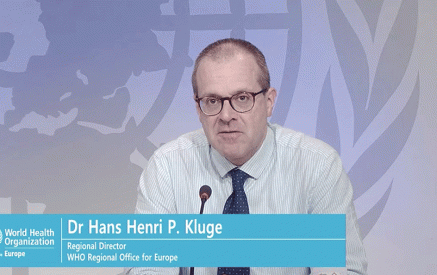VIENNA, 30 April 2020 – How to address the consequences of the COVID-19 pandemic for the most vulnerable in our societies, especially for human trafficking victims and survivors, is the focus of a set of recommendations to governments published by the OSCE Special Representative and Co-ordinator for Combating Trafficking in Human Beings Valiant Richey today.
Building on his earlier statement to OSCE participating States, Richey alerted governments to the risk that, without urgent and targeted action, this health and economic crisis becomes a human trafficking crisis, putting many more lives and the cohesion of our societies at risk. “The impact of the COVID-19 crisis on trafficking in human beings is deeply concerning. Our recommendations aim to support OSCE participating States in combating trafficking in human beings during and following the current crisis, as vulnerabilities will compound in the weeks and months to come,” he said.
The Special Representative stands ready to provide further support to participating States, including through tailored technical assistance for the development and implementation of anti-trafficking action plans and other legislative or policy efforts.
Prevention
Read also
1. Ensure universal access to essential economic and social welfare services, including unemployment aid, for all those who need them, regardless of their recent employment history. This will help prevent those affected by the economic impact of the crisis, including millions of unregistered domestic workers, from falling into the hands of traffickers.
2. Grant or extend temporary resident permits to migrants and asylum seekers, regardless of their legal status. This will increase their resilience by facilitating access to healthcare and other welfare services and will also help States’ authorities and social services promptly identify presumed victims of trafficking and better prevent future episodes of exploitation.
3. Prioritize resources for exit services in high-risk sectors such as the prostitution industry. With purchasing of commercial sex artificially suppressed as a result of the lockdown, inclusive programmes ensuring support can be a powerful tool to break the cycle of exploitation and strengthen exit pathways, giving a real alternative to those in need.
Protection
4. Provide victims of trafficking with access to safe and immediate accommodation, health care and psychological assistance, to assist in their exit from trafficking and protect them from revictimization. Temporary quarantine accommodation prior to shelter placement has been identified as a promising practice to ensure compliance with COVID-19 prevention measures.
5. Extend for at least six months all protection and assistance measures for all victims of trafficking, including work permits and access to services, to ensure continuity in their social inclusion process beyond the current health crisis. Continue investments in rehabilitation programmes, as the risk of ‘losing’ those survivors who are already in transition is now particularly high due to the adverse economic situation. Provide online support to victims of trafficking inside and outside shelters. Psychological counselling, legal support as well as educational and training activities are examples of the services which might be temporarily provided remotely to ensure the continuity of victim’s support and to prevent re-trafficking.
6. Establish or strengthen hotlines for human trafficking, domestic violence and child abuse (including online) reporting, and broadly promote their services as a tool for the identification of presumed cases of human trafficking.
Prosecution
7. Ensure high alert among law enforcement and other first line responders to recognize and detect human trafficking. With traffickers likely to pivot to online exploitation, and with police, labour inspectors, social workers, healthcare professionals, educators and NGOs currently dramatically limited in their anti-trafficking efforts, detection and suppression efforts will have to adapt to a changing environment.
8. Ensure the continuity of the justice system to investigate and prosecute traffickers even in times of lockdown. For example, holding court via video or teleconferencing should be considered and actively pursued whenever possible as a tool to ensure timely justice and avoid re-traumatizing victims.
9. Investigators should be prepared as traffickers change their modus operandi, increasing online enforcement presence and employing advanced investigative instruments, including financial investigation tools to detect human trafficking in financial flows due to an increase in non-cash payments.
10. Plan systemic labour inspections of high-risk industries immediately after business operations resume. Agriculture, due to the summer harvest, is a prime example of an area to monitor with particular attention.
11. Once lockdown measures are lifted, keep a high law enforcement alert on forms of trafficking that are likely to increase in the near future, such as online exploitation and forced begging.
Partnership
12. Incentivize or mandate technology companies to identify and eradicate risks of human trafficking on their platforms, including by identifying and stopping distribution of child sexual abuse material online. Establish or strengthen law enforcement and judicial co-operation, including at the pre-trial stage, with countries of origin and destination in cases of online exploitation, especially of children.
Looking ahead
13. Plan ahead to ensure that the anti-trafficking community can respond adequately to another possible Coronavirus outbreak. The forecast for a second COVID-19 wave later this year highlights the need to ensure that assistance facilities, protection programmes, investigations and courts continue functioning during possible future lockdown measures.
OSCE


























































